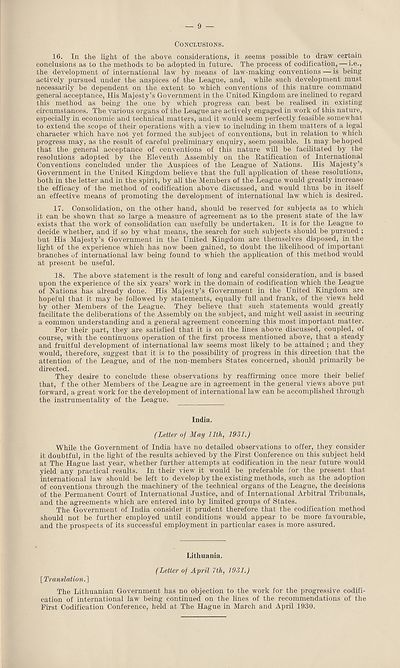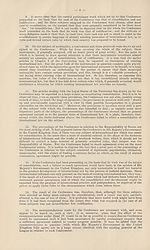Legal > Progressive codification of international law : Observations by the governments : series 1
(9)
Download files
Complete book:
Individual page:
Thumbnail gallery: Grid view | List view

— 9 —
Conclusions.
16. In the light of the above considerations, it seems possible to draw certain
conclusions as to the methods to be adopted in future. The process of codification,—i.e.,
the development of international law by means of law-making conventions — is being
actively pursued under the auspices of the League, and, while such development must
necessarily be dependent on the extent to which conventions of this nature command
general acceptance, His Majesty’s Government in the United Kingdom are inclined to regard
this method as being the one by which progress can best be realised in existing
circumstances. The various organs of the League are actively engaged in work of this nature,
especially in economic and technical matters, and it would seem perfectly feasible somewhat
to extend the scope of their operations with a view to including in them matters of a legal
character which have not yet formed the subject of conventions, but in relation to which
progress may, as the result of careful preliminary enquiry, seem possible. It may be hoped
that the general acceptance of conventions of this nature will be facilitated by the
resolutions adopted by the Eleventh Assembly on the Ratification of International
Conventions concluded under the Auspices of the League of Kations. His Majesty’s
Government in the United Kingdom believe that the full application of these resolutions,
both in the letter and in the spirit, by all the Members of the League would greatly increase
the efficacy of the method of codification above discussed, and would thus be in itself
an effective means of promoting the development of international law which is desired.
17. Consolidation, on the other hand, should be reserved for subjects as to which
it can be shown that so large a measure of agreement as to the present state of the law
exists that the work of consolidation can usefully be undertaken. It is for the League to
decide whether, and if so by what means, the search for such subjects should be pursued ;
but His Majesty’s Government in the United Kingdom are themselves disposed, in the
light of the experience which has now been gained, to doubt the likelihood of important
branches of international law being found to which the application of this method would
at present be useful.
18. The above statement is the result of long and careful consideration, and is based
upon the experience of the six years’ work in the domain of codification which the League
of Rations has already done. His Majesty’s Government in the United Kingdom are
hopeful that it may be followed by statements, equally full and frank, of the views held
by other Members of the League. They believe that such statements would greatly
facilitate the deliberations of the Assembly on the subject, and might well assist in securing
a common understanding and a general agreement concerning this most important matter.
For their part, they are satisfied that it is on the lines above discussed, coupled, of
course, with the continuous operation of the first process mentioned above, that a steady
and fruitful development of international law seems most likely to be attained ; and they
would, therefore, suggest that it is to the possibility of progress in this direction that the
attention of the League, and of the non-members States concerned, should primarily be
directed.
They desire to conclude these observations by reaffirming once more their belief
that, f the other Members of the League are in agreement in the general views above put
forward, a great work for the development of international law can be accomplished through
the instrumentality of the League.
India.
(Letter of May 11th, 1931.)
While the Government of India have no detailed observations to offer, they consider
it doubtful, in the light of the results achieved by the First Conference on this subject held
at The Hague last year, whether further attempts at codification in the near future would
yield any practical results. In their view it would be preferable for the present that
international law should be left to develop by the existing methods, such as the adoption
of conventions through the machinery of the technical organs of the League, the decisions
of the Permanent Court of International Justice, and of International Arbitral Tribunals,
and the agreements which are entered into by limited groups of States.
The Government of India consider it prudent therefore that the codification method
should not be further employed until conditions would appear to be more favourable,
and the prospects of its successful employment in particular cases is more assured.
Lithuania.
(Letter of April 7th, 1931.)
[Translation.]
The Lithuanian Government has no objection to the work for the progressive codifi¬
cation of international law being continued on the lines of the recommendations of the
First Codification Conference, held at The Hague in March and April 1930.
Conclusions.
16. In the light of the above considerations, it seems possible to draw certain
conclusions as to the methods to be adopted in future. The process of codification,—i.e.,
the development of international law by means of law-making conventions — is being
actively pursued under the auspices of the League, and, while such development must
necessarily be dependent on the extent to which conventions of this nature command
general acceptance, His Majesty’s Government in the United Kingdom are inclined to regard
this method as being the one by which progress can best be realised in existing
circumstances. The various organs of the League are actively engaged in work of this nature,
especially in economic and technical matters, and it would seem perfectly feasible somewhat
to extend the scope of their operations with a view to including in them matters of a legal
character which have not yet formed the subject of conventions, but in relation to which
progress may, as the result of careful preliminary enquiry, seem possible. It may be hoped
that the general acceptance of conventions of this nature will be facilitated by the
resolutions adopted by the Eleventh Assembly on the Ratification of International
Conventions concluded under the Auspices of the League of Kations. His Majesty’s
Government in the United Kingdom believe that the full application of these resolutions,
both in the letter and in the spirit, by all the Members of the League would greatly increase
the efficacy of the method of codification above discussed, and would thus be in itself
an effective means of promoting the development of international law which is desired.
17. Consolidation, on the other hand, should be reserved for subjects as to which
it can be shown that so large a measure of agreement as to the present state of the law
exists that the work of consolidation can usefully be undertaken. It is for the League to
decide whether, and if so by what means, the search for such subjects should be pursued ;
but His Majesty’s Government in the United Kingdom are themselves disposed, in the
light of the experience which has now been gained, to doubt the likelihood of important
branches of international law being found to which the application of this method would
at present be useful.
18. The above statement is the result of long and careful consideration, and is based
upon the experience of the six years’ work in the domain of codification which the League
of Rations has already done. His Majesty’s Government in the United Kingdom are
hopeful that it may be followed by statements, equally full and frank, of the views held
by other Members of the League. They believe that such statements would greatly
facilitate the deliberations of the Assembly on the subject, and might well assist in securing
a common understanding and a general agreement concerning this most important matter.
For their part, they are satisfied that it is on the lines above discussed, coupled, of
course, with the continuous operation of the first process mentioned above, that a steady
and fruitful development of international law seems most likely to be attained ; and they
would, therefore, suggest that it is to the possibility of progress in this direction that the
attention of the League, and of the non-members States concerned, should primarily be
directed.
They desire to conclude these observations by reaffirming once more their belief
that, f the other Members of the League are in agreement in the general views above put
forward, a great work for the development of international law can be accomplished through
the instrumentality of the League.
India.
(Letter of May 11th, 1931.)
While the Government of India have no detailed observations to offer, they consider
it doubtful, in the light of the results achieved by the First Conference on this subject held
at The Hague last year, whether further attempts at codification in the near future would
yield any practical results. In their view it would be preferable for the present that
international law should be left to develop by the existing methods, such as the adoption
of conventions through the machinery of the technical organs of the League, the decisions
of the Permanent Court of International Justice, and of International Arbitral Tribunals,
and the agreements which are entered into by limited groups of States.
The Government of India consider it prudent therefore that the codification method
should not be further employed until conditions would appear to be more favourable,
and the prospects of its successful employment in particular cases is more assured.
Lithuania.
(Letter of April 7th, 1931.)
[Translation.]
The Lithuanian Government has no objection to the work for the progressive codifi¬
cation of international law being continued on the lines of the recommendations of the
First Codification Conference, held at The Hague in March and April 1930.
Set display mode to:
![]() Universal Viewer |
Universal Viewer | ![]() Mirador |
Large image | Transcription
Mirador |
Large image | Transcription
Images and transcriptions on this page, including medium image downloads, may be used under the Creative Commons Attribution 4.0 International Licence unless otherwise stated. ![]()
| League of Nations > Legal > Progressive codification of international law : Observations by the governments : series 1 > (9) |
|---|
| Permanent URL | https://digital.nls.uk/191516391 |
|---|
| Shelfmark | LN.V |
|---|
| Description | Over 1,200 documents from the non-political organs of the League of Nations that dealt with health, disarmament, economic and financial matters for the duration of the League (1919-1945). Also online are statistical bulletins, essential facts, and an overview of the League by the first Secretary General, Sir Eric Drummond. These items are part of the Official Publications collection at the National Library of Scotland. |
|---|---|
| Additional NLS resources: |
|

